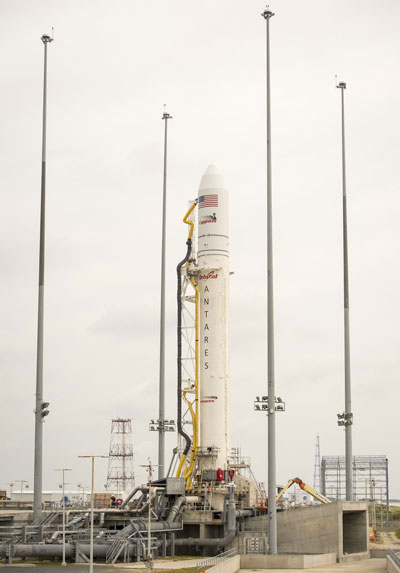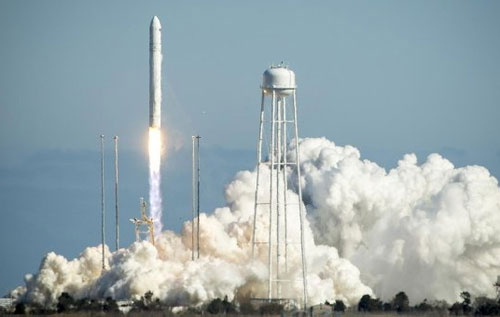The private spacecraft Cygnus is about to leave the launch pad
The US Department of Aeronautics and Space (NASA) on September 16 confirmed the first flight of Cygnus private spacecraft to the International Space Station (ISS) will take place this week at a space airport in Virginia state.
Reuters said that if the mission is unmanned on success, Orbital Sciences will follow SpaceX to become the first private company to participate in space flights, bringing supply ships to ISS, dance stations. The $ 100 billion pillar is on orbit about 400km from Earth.

Antares missile on launch pad in Virginia to prepare for the first mission of Cygnus to fly to ISS - (Photo: AFP)
Under the plan, Cygnus is mounted on a two-story rocket Antares which will take off at 1050 hrs on September 18 (US time) from NASA's Wallops Missile Launching Center on Wallops Island, on the Atlantic Ocean. in Virginia.
On April 21, the 40-meter-high Antares rocket of Orbital Sciences was developed with support from NASA, having had its first successful test, when portraying a lifelike model of Cygnus. weighed 3,800kg on orbit 254km from Earth.
In the upcoming mission, when leaving the launch pad, Cygnus will fly to approach the ISS and be assembled by astronauts in the towing station with the connecting port by the robot arm of the station. The ship will stay in the station for about a month for this test mission.
If successful as expected, in December, Orbital Sciences will launch Cygnus to make the first official flight for a contract with NASA.

The Antares missile left the launcher on Wallops on April 21 - (Photo: NASA)
It is known that Antares was built by Orbital Sciences in a $ 1.9 billion cooperation program with NASA to bring the company's Cygnus spacecraft to bring goods to ISS. In total, Orbital Sciences will have eight trips to ship Cygnus to ISS to complete the contract.
Earlier, SpaceX Company of internet billionaire Elon Musk opened a new chapter in the exploration of the universe with the participation of private companies and organizations, when successfully bringing the Dragon spacecraft to supply goods. for ISS.
After a successful test flight, the Dragon ship came to connect with ISS on May 22, 2012, SpaceX made the first two commercial flights to the universe on October 8, 2012 and March 1, 2012. / 2013, in a $ 1.6 billion contract signed in 2008 with NASA for 12 Dragon's flights to ISS.
With this success, the Dragon has filled the gap in the US space program, by helping the country restore space flights, first of all transporting goods to ISS, after the shuttle fleet The US expires in 2011.
SpaceX is planning to develop the Dragon ship as a manned spacecraft to fly to ISS before 2015, in order to compete with Russia, which holds a monopoly in bringing people to space by Soyuz. Each seat on the Soyuz ship that NASA has to pay for Russia is 63 million USD.

Dragon transport spacecraft in flight to ISS in late May 2012 - (Photo: Reuters / NASA)
Unlike Dragon, which can return to Earth, Orbital Sciences' Cygnus vessel, when completed, will be burned in the ISS's waste atmosphere.
- The ship Cygnus first 'docked' ISS
- Cygnus postpones 'docking' ISS due to positioning error
- The Soyuz crash, the ship Cygnus again postponed the ISS landing
- Cygnus' ships docked at the international space station
- The spacecraft delayed flying because of the solar storm
- Cygnus private transport vessel leaves the International Space Station
- NASA confirmed its plan to send the Cygnus to the International Space Station in October
- Prepare to launch the first private spacecraft to ISS
- Postpone the launch date of the first private spacecraft
- NASA tests burning spacecraft in space
- American private company takes spacecraft to the Moon
- Cygnus cargo ship successfully assembled with ISS station
 Van Allen's belt and evidence that the Apollo 11 mission to the Moon was myth
Van Allen's belt and evidence that the Apollo 11 mission to the Moon was myth The levels of civilization in the universe (Kardashev scale)
The levels of civilization in the universe (Kardashev scale) Today Mars, the sun and the Earth are aligned
Today Mars, the sun and the Earth are aligned The Amazon owner announced a secret plan to build a space base for thousands of people
The Amazon owner announced a secret plan to build a space base for thousands of people